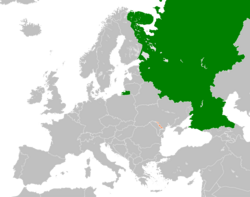Russia–Transnistria relations
 | |
Russia |
Transnistria |
|---|---|
Russia–Transnistria relations (Russian: Российско-приднестровские отношения) is the bilateral relationship between the Pridnestrovian Moldavian Republic (Transnistria) and the Russian Federation. Russia does not officially recognize the independence of Transnistria; nevertheless, Russia maintains special relations with Transnistria in the political, military, cultural, and economic spheres.
History[]
The state of Transnistria was created by local economic elites with special relations to the Soviet and later Russian political centre.[1]
During the reign of Igor Smirnov (1991–2011) maintaining special relations with Russia was a priority of Transnistrian foreign policy.[2] Russia is a member of the 5+2 format for negotiating a settlement of the Transnistria conflict established during Smirnov's rule.[3] At the end of his tenure however, Russia pushed for a change at the helm of the state in the 2011 Transnistrian presidential election.[4]
During a visit to Kyiv in 2010, President Dmitri Medvedev said he supported a "special status" for Transnistria and recognised the "important and stabilising" role of the Russian army.[5] In the early 2010s, experts estimated that Russia is aiming for a so-called "Taiwanisation" of Transnistria.[6]
In 2021, the Transnistrian foreign minister visited Russia and met with a Russian Ambassador-at-Large. During their conversation, the two representatives discussed various fields of Russian-Transnistrian relations, including the COVID-19 pandemic in Transnistria.[7]
Consular relations[]
In 2012, Russia opened a consulate in Transnistria, despite protests of the government of Moldova.[8] Nevertheless, Russia has not recognized Transnistria as an independent state.
In 2017, Transnistria opened a provisional bureau in Moscow.[9] Alexandru Caraman, former vice-president of Transnistria (1990–2001) and former foreign minister of the Donetsk People's Republic (2014), led the bureau, which was shortly thereafter closed.[10] Two years later, an official diplomatic bureau of Transnistria was opened in Moscow.[11] Later that year, the Transnistrian government asked Russian authorities if they could issue passports and other documents in the diplomatic bureau.[12] The bureau is located in Povarskaya Street and currently led by Leonid Manakov, the Vice President of the Lawyer’s Union of the Russian Federation.[13]
See also[]
References[]
- ^ Jan Zofka: Postsowjetischer Separatismus: Die pro-russländischen Bewegungen im moldauischen Dnjestr-Tal und auf der Krim 1989–1995, Göttingen: Wallstein Verlag, 2015, passim.
- ^ Marcin Kosienkowski: Continuity and Change in Transnistria’s Foreign Policy after the 2011 Presidential Elections, Lublin: The Catholic University of Lublin Publishing House, 2012, p. 23. Available here.
- ^ Socor, Vladimir (26 September 2018). "De-sovereignization: testing a conflict-resolution model at Moldova's expense in Transnistria (part two)". Jamestown Foundation.
- ^ Witold Rodkiewicz/Agata Wierzbowska-Miazga: Russia is pushing for a change of power in Transnistria, osw.waw.pl/en/ 9 November 2011.
- ^ Anne-Marie Blajan: The Transnistrian conflict: Russia and Ukraine talk about "coordinated effort", American analysts consider the US has abandoned the neighbourhood to Russia, english.hotnews.ro 18 May 2010.
- ^ Witold Rodkiewicz: Russia’s strategy towards Moldova: continuation or change?, osw.waw.pl/en/ 19 April 2012.
- ^ Виталий Игнатьев встретился с Послом по особым поручениям МИД России Виталием Тряпицыным (Vitaly Ignatiev met with Ambassador-at-Large of the Russian Foreign Ministry Vitaly Tryapitsyn), Transnistrian Ministry of Foreign Affairs 2 April 2021.
- ^ Helena Rytövuori-Apunen: Power and Conflict in Russia’s Borderlands: The Post-Soviet Geopolitics of Dispute Resolution, London: Bloomsbury Publishing, 2019, p. 122. Google Books preview here.
- ^ Cristi Vlas: Representation office of Transnistria was opened in Moscow, Russia, moldova.org 26. January 2017.
- ^ Mădălin Necșuțu: Breakaway Moldova Region to Open ‘Embassy’ in Russia, balkaninsight.com 14. January 2019.
- ^ Robert O’Connor: Transnistria Isn’t the Smuggler’s Paradise It Used to Be, foreignpolicy.com 5. June 2019.
- ^ Mădălin Necșuțu: Transnistria Seeks Russia’s Blessing to Issue Passports in Moscow, balkaninsight.com 7. October 2019.
- ^ Official Representation of the Pridnestrovian Moldavian Republic in Moscow, mid.gospmr.org (without date).
- Moldova–Russia relations
- Bilateral relations of Russia
- Bilateral relations of Transnistria
